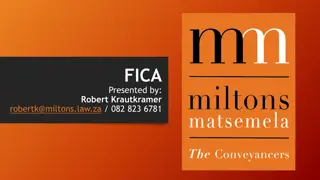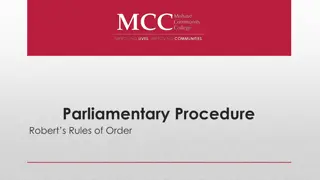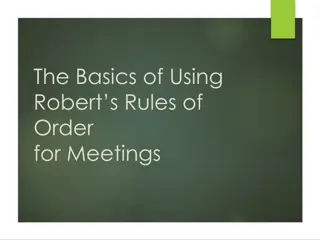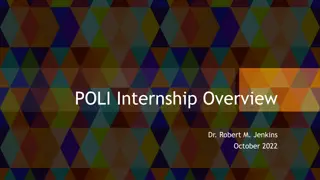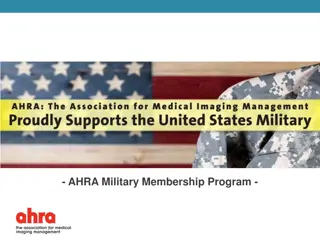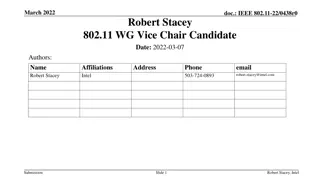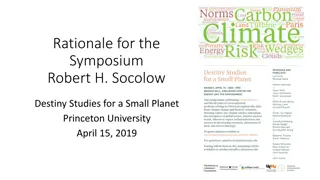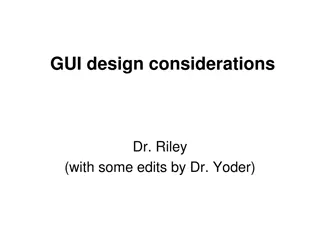
Governmental Plans Under ERISA: Pensions, Benefits, and Exemptions Explained
Explore the intricacies of governmental plans under ERISA, including pensions, benefits, and exemptions. Learn about essential government functions, commercial activities, and compliance guidelines. Dive into historical treatments of Tribal governments and the impact of the Pension Protection Act. Gain insights into shared employees, control group rules, and more.
Download Presentation

Please find below an Image/Link to download the presentation.
The content on the website is provided AS IS for your information and personal use only. It may not be sold, licensed, or shared on other websites without obtaining consent from the author. If you encounter any issues during the download, it is possible that the publisher has removed the file from their server.
You are allowed to download the files provided on this website for personal or commercial use, subject to the condition that they are used lawfully. All files are the property of their respective owners.
The content on the website is provided AS IS for your information and personal use only. It may not be sold, licensed, or shared on other websites without obtaining consent from the author.
E N D
Presentation Transcript
1 28thAnnual Conference September 23-25, 2024 DURANT, OKLAHOMA
Pension and Benefits Parity / ERISA exemptions for government plans General Welfare Exclusion proposed guidance, September 17, 2024 Presenter: Robert R. Yoder, Esq. Yoder & Langford, P.C. 2
Introduction and background to TTAC guidance projects Tribal Pensions and benefits / ERISA exemptions for government plans General Welfare Exclusion guidance 3
Background Treatment of governments under ERISA Historic treatment of Tribal governments as Governments Early IRS determination letters Pre-gaming Post-gaming pushback on government status Essential government function and commercial activities tests NLRB and the PPA Current status - Two sets of Rules: Private Sector Government Sector 4
WHAT DOES THE PPA ACTUALLY PROVIDE? A governmental plan includes a plan that is adopted by a Tribe, a subdivision of a tribe, or an agency or instrumentality of a tribe, AND: All of the participants of which are employees of such entity Substantially all of whose services as such an employee Are in the performance of essential government functions But not in the performance of commercial activities (whether or not an essential government function). 5
What is an essential government function? What is commercial ? What is all and substantially all ? What are the deadlines? How are shared employees handled? How are control group rules to be coordinated QSLOBS ? 6
2006-89: Casinos, Marinas, Convenience Stores, Service Stations, Hotels. . . Schools Ability to split or spin off plans 2007-67: Very LIMITED document relief Does not cover operational compliance No cut backs. Provides no substantive guidance Does not cover pre-PPA. Everything is on the table 7
Parity Bills Adoption of uniform protections and fiduciary standards? Jurisdiction (Tribal / Federal) Moratorium Executive Order 13175 / WMAT litigation 8
Amendments to the Internal Revenue Code of 1986 Enforcement Moratorium related to PPA of 2006 Uniform Protections and Fiduciary Standards for Tribal Plans Notice Requirements - SPD Persons Empowered to Bring a Civil Action Status of Tribal Pension Plan as Entity Jurisdiction Coordination with Other Tribal Laws and Protection Regulations TTAC 9
Pre-Act Law: IRS recognized that governments could provide non- taxable benefits under the general welfare doctrine : Applied to certain government programs That promoted the general welfare Were needs based ; and Were not compensation for services The doctrine was developed mostly though Revenue Rulings and PLRs. For example: Rev Rul. 98-19 (relocation assistance for flood victims) Rev. Rul. 74-205 (Housing assistance) Rev Rul. 76-144 (disaster relief) 10
In the early 2000s and through 2011, IRS had been performing 941 audits of Tribal governments These audits generally required Tribes to match most payments with a W2, a 1099, or an exemption. Tribal assistance was often treated as non-taxable by Tribes under the general welfare doctrine, but not always based on a showing of individual need. Thus, starting a dialogue on community versus individual need. PLR 199924026 / 113304-98 (small business grants) Public schools.... Cultural Preservation... 11
A success story in consultation Executive Order 13175 The Evolution of Guidance Notice 2011-94 (Opening of consultation) Notice 2012-75 (first safe harbors ) Notice 2014-35 (updated safe harbors ) General Welfare Exclusion Act of 2014 IRS Notice 2015-34 Current TTAC guidance projects 12
The safe harbor approach was introduced in Notice 2012-75 and expanded in Rev. Proc. 2014-35 Within five safe harbor categories: Benefits must be provided pursuant to a specific Indian tribal government program The program must have written guidelines Benefits must be available to all qualified recipients who satisfy program guidelines, subject to budgetary restraints Benefits cannot discriminate in favor of members of the governing body of the Tribe Benefits cannot be compensation for services Benefits cannot be lavish or extravagant under the facts and circumstances Applied to members and qualified non-members 13
housing assistance educational assistance elder and disabled assistance other qualifying assistance cultural and religious programs 14
Following enactment of the General Welfare Exclusion Act, IRS issued Notice 2015-34 confirming that: New Code Section 139E codifies (but does not supplant) the general welfare exclusion Taxpayers may continue to rely on Rev. Proc. 2014-35 pending guidance under the Act. 15
Calls for the establishment of a new Tribal Advisory Committee (the TTAC ) 7 members 3 from Treasury 4 Congressional appointees TTAC to work with Treasury on guidance Temporary suspension of GWE examinations Special rule of statutory construction 16
Ambiguities in section 139E of such Code, as added by this Act, shall be resolved in favor of Indian tribal governments and deference shall be given to Indian tribal governments for the programs administered and authorized by the tribe to benefit the general welfare of the tribal community. 17
The Secretary of the Treasury shall suspend all audits and examinations of Indian tribal governments and members of Indian tribes (or any spouse or dependent of such a member), to the extent such an audit or examination relates to the exclusion of a payment or benefit from an Indian tribal government under the general welfare exclusion, until the education and training prescribed by section 3(b)(2) of this Act is completed.... 18
The Secretary of the Treasury may waive any interest and penalties imposed under such Code on any Indian tribal government or member of an Indian tribe (or any spouse or dependent of such a member) to the extent such interest and penalties relate to excluding a payment or benefit from gross income under the general welfare exclusion. 19
The running of any period of limitations under section 6501 of the Internal Revenue Code of 1986 with respect to Indian tribal governments and members of Indian tribes shall be suspended during the period during which audits and examinations are suspended under the preceding sentence. 20
Gross income does not include the value of any Indian general welfare benefits Indian general welfare benefits include any payments made or services provided to or on behalf of a member, spouse or dependent if: The program is administered under specified guidelines that do not discriminate in favor of the governing body of the Tribe Benefits are available to any Tribal member who meets the guidelines Benefits are for the promotion of the general welfare; Benefits are not lavish or extravagant; and Benefits are not compensation for services 21
Expectation that the Act will be construed no less favorable than the safe harbor approach provided for in Revenue Procedure 2014-35 that in no event will IRS require an individualized determination of financial need where a tribal Program meets all other requirements of new section 139E as added by the bill. It would be contrary to the intent of Congress if IRS were to take the occasion of passage of H.R. 3043 or S. 1507 to retrench, narrow or possibly withdraw the administrative guidance provided in Rev. Proc. 2014-35 after enactment of the bill. The intent is to expand rather than restrict the safe harbor provisions in Rev. Proc. 2014- 35. The purpose of this legislation is to further empower Tribal self determination. Tribes, and not the IRS, are in the best position to determine the needs of their members and provide for the general welfare of their tribal citizens and communities. 22
June 20, 2019 inaugural meeting Established three work groups / subcommittees: GWE Tribal pensions Dual taxation GWE subcommittee prepared a report and proposed draft regulations for consideration by Treasury Consultation meetings December, 2022 2023 2024 Meetings with IRS September 17, 2024 proposed regulations published Comments due: December 16, 2024 Consultations: November 18, 19, and 20, 2024 Public Hearing: January 13, 2025 23
Reflect many priorities of Indian Country, including substantial deference to Tribes as they create and implement GWE programs. However, work remains to improve clarity of the guidance and address unresolved issues. Complete deference to Tribal governments to determine whether a benefit is for the promotion of general welfare. No limitation on source of funds; GWE programs can be funded with any source including gaming revenue. However, must be careful with per capita/Revenue Allocation Plans. Deference to Tribal governments on whether an activity is a cultural or ceremonial activity for the transmission of Tribal culture. 24
Whether a benefit is lavish or extravagant is based on facts and circumstances at the time the benefit is provided. Relevant facts and circumstances include a Tribe s culture and cultural practices, history, geographic area, traditions, resources, and economic conditions or factors. If a Tribe has a written GWE program, the IRS will presume the benefit is not lavish or extravagant. Proposed regulations unclear on how if at all this presumption can be rebutted. 25
Possible comments: Trusts Compensation Substantiation Economic Development Audit suspension 26
Q & As 27
Robert R. Yoder Yoder & Langford, P.C. robert@yoderlangford.com


